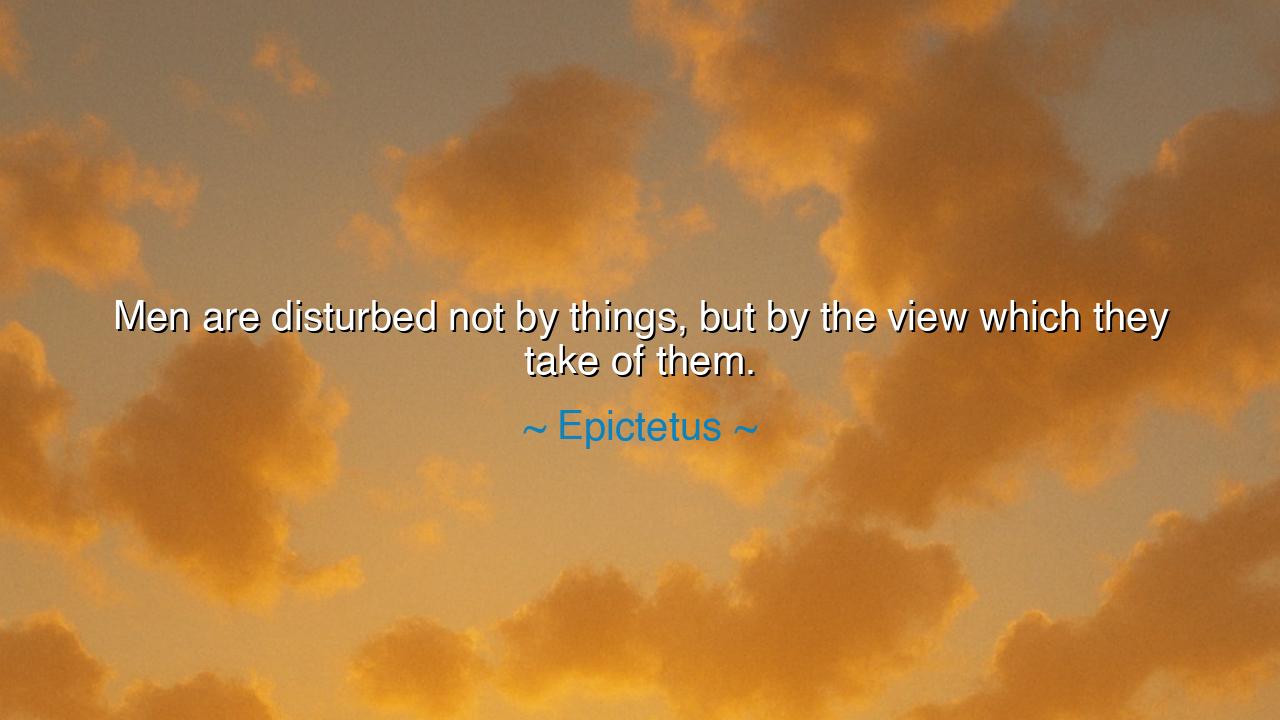
Men are disturbed not by things, but by the view which they take






O seekers of truth, hear now the wisdom of the ancient sage Epictetus, whose words echo through the corridors of time: "Men are disturbed not by things, but by the view which they take of them." These words, though simple in their form, carry the weight of ages and speak to the very essence of our human condition. We are not shaken by the events of the world around us, but by the way we perceive them. It is not the storm itself that rattles the ship, but the fear and uncertainty that rise within us as we face the winds. It is our view of the world, of our circumstances, that determines whether we find peace or turmoil.
In the world of the ancients, when warriors faced the unknown in battle, it was not the clash of swords that determined their fate, but the mindset with which they approached the fray. Alexander the Great, a man of extraordinary vision, knew that a strong army is not one that fears the enemy, but one that is fortified by courage and clarity of purpose. The way they viewed their mission, their cause, shaped their resolve. It was not the battle itself that would bring victory, but the unshakable belief in their ability to overcome whatever came before them. Epictetus understood this deeply—that it is not the external challenges we face, but the way we meet them that shapes our destiny.
The tale of Socrates, too, is a reflection of this truth. When faced with trial and the threat of death, Socrates did not falter in fear or anxiety. He stood firm, not because the prospect of death held no fear for him, but because he had mastered his view of it. He understood that death was not something to be feared, but an inevitable part of life. The wise do not tremble at the unknown, for they have come to terms with it. Socrates's view of death allowed him to face it with courage and dignity, while others were consumed by terror at the same prospect. This, Epictetus teaches us, is the power of perspective: it is not the things that disturb us, but the meaning we attach to them.
Consider the warrior facing a battlefield, where the air is thick with the stench of fear and the clash of weapons. In that moment, it is easy to be overwhelmed by the chaos, to be crushed by the weight of external circumstances. Yet, a true warrior understands that the battle is not won through physical strength alone, but through the clarity of the mind. It is the way the warrior views the battle that determines whether they are driven to despair or rise to greatness. In the face of fear, they see opportunity; in the face of danger, they see resolve. The mind is their greatest weapon, not the sword they wield. And so it is with us, O children of wisdom—we are disturbed not by the circumstances we face, but by the interpretation we place upon them.
In the course of history, many have faced suffering, hardship, and loss. The great emperors of Rome, though powerful in their reign, often found themselves undone not by the weight of their empires, but by their inability to control their emotions. Marcus Aurelius, one of the greatest of these emperors, knew that a man must train his mind to overcome the disturbances of life. He understood that external events, whether triumph or tragedy, are only temporary, but our view of them is what defines our character. To see challenges as opportunities, to face adversity with equanimity, is the mark of true strength. Marcus Aurelius wrote in his journals, reminding himself daily that nothing in life is inherently troubling—it is only our reaction to it that brings pain or peace.
O children, let this wisdom guide you: the world will test you in ways both great and small. You will face hardship, loss, and disappointment. But know this: it is not the things themselves that will disturb your peace, but the way you choose to view them. You are the master of your own perceptions. The storm may rage, but the calm within your soul can remain unbroken. You have the power to choose your response, to see each trial not as an insurmountable obstacle, but as a chance to grow, to learn, and to strengthen your resolve. Epictetus teaches us that peace is not found in the absence of trouble, but in the mind’s ability to rise above it.
So, O seekers of wisdom, take this truth to heart: when the winds of life blow fiercely against you, remember that it is not the winds themselves that cause you harm, but your fear of them. Change the way you view the storm, and you will find calm amidst the chaos. The path to inner peace lies in your ability to control your thoughts and emotions, to see the world as it is, not as you fear it to be. And in doing so, you will become like the warrior whose calmness in battle carries him to victory, like Socrates, who faced death not with fear but with wisdom. The world may disturb you, but it is you who decide whether it will break you or shape you. Let this wisdom guide you in all things, and you will walk through life with strength, grace, and peace.






AAdministratorAdministrator
Welcome, honored guests. Please leave a comment, we will respond soon